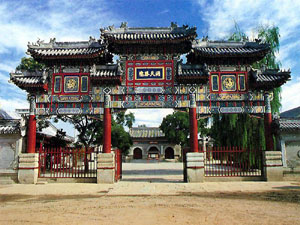 For some reason, the White Cloud Temple is often left off tourist itineraries. But while Buddhist temples and lamasaries are fairly common throughout China, it isn't easy to find a temple where Religious Taoism (Daoism), one of China's great religions and its only indigenous faith, is still actively practiced.
For some reason, the White Cloud Temple is often left off tourist itineraries. But while Buddhist temples and lamasaries are fairly common throughout China, it isn't easy to find a temple where Religious Taoism (Daoism), one of China's great religions and its only indigenous faith, is still actively practiced.
At the Baiyunguan, you can see Daoism in action--chanting, meditating, long-haired Daoist priests and all.
Few Western visitors have any real conception of the Taoist religion practiced at the White Cloud Temple. Religious Taosim is generally spoken of as distinct from the Taoist philosophy represented by the semi-mythical Lao Zi (Lao Tzu), the reputed author of the Dao De Jing, or "Classic of the Way and its Power." While Religious Taoists see themselves as deriving from the Taoism of Lao Tzu and Zhuang Zi, their interpretations of these classics center on concrete macrobiotic health practices and alchemy, and not on the more abstract epistemology and metaphysics of Dao De Jing and Zhuang Zi's works. Furthermore, Religious Taoists worship The Way as an actual deity-- Tai Shang Lao Jun, or Lord Lao Most High, is the apotheosis of the Tao itself. Religious Taoism first took root in the 2nd century AD, and was often associated with anti-dynastic millenarian uprisings like the Yellow Turbans of the late 2nd centruy. It infused Chinese Buddhism with much of its terminology, and lent to Chinese Chan (Zen) Buddhism much of its focus on meditation.
The White Cloud Temple is an ancient, quiet enclave in the heart of the modern, noisy city, but more importantly it is a window onto a little-understood but highly influential ingredient in the Chinese culture make-up. Not something to be missed.
Ticket: 10 yuan (US$1.2)
Open Time: 9:00-16:30
Address: 6 Baiyunguan Jie, Xibianmenwai, Xuanwu District, Beijing
Tel: 6346-3531
Transportation: Bus 1, 4, 19, 48, 49, 308, 390.
(china.org.cn March 31, 2003)
|

